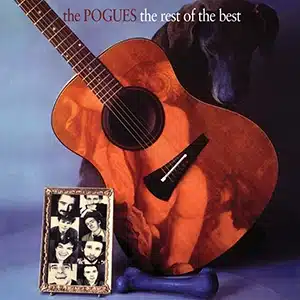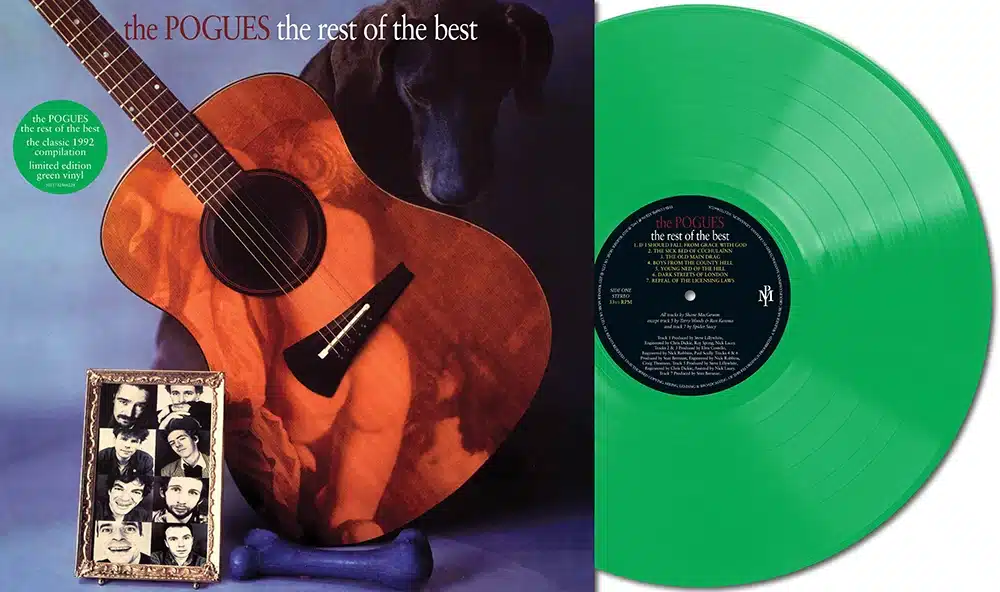
The Pogues always painted portraits of shaggy underdogs who were broke but not broken, embattled but still very much in the battle to survive, sympathetic if surly.
 The Rest of the Best The Pogues Rhino 14 March 2025
The Rest of the Best The Pogues Rhino 14 March 2025
The world lost a good one when it was last call for Shane McGowan. The frontperson of the Pogues left this life in 2023, leaving behind a singularly enjoyable and inspiring legacy captured in part on this mighty sampling of their work.
To their fans, the Pogues delivered a vision of a rough, sometimes cruel world still worth raising a pint to. The members were all excellent musicians, but McGowan’s outsized persona and singular songwriting lifted them to something extraordinary, even if his bittersweet vision and black humor are not everyone’s cup of Guinness.

The Rest of the Best, initially released in 1992 and now out on transparent green vinyl, is a follow-up to an earlier greatest hits album, so the band’s best-known song, “Fairytale of New York”, is not here, but no matter. There are still more than enough great tunes to sate your thirst for the Pogues’ rowdy playing and what seems like a genre unto itself.
The Pogues were born in the bathroom of a London concert hall during a Ramones‘ concert in 1982—and the members aligned the fury of punk with the rebellious streak of Irish history. After the BBC rejected their original name, Pogue Mahone (based on the Irish pog mo thoin for “kiss my ass”), they shortened their name and dropped two folk-punk albums that established their distinction among the new wave of music that emerged after the punk explosion. Eventually, MacGowan’s erratic behavior led to him being kicked out of the group in 1991, though he rejoined briefly a few years later.
Hard drinking and known for raucous shows, the Pogues nevertheless grew musically and looked for more territory to conquer, becoming able to master any number of genres (here, for example, the peppy zydeco accordion of “London Girl”). What continued throughout was their celebration of the poor sods who worked and drank hard, whether it was factory workers, desperate immigrants or army grunts. The Pogues always painted portraits of shaggy underdogs who were broke but not broken, embattled but still very much in the battle to survive, sympathetic if surly.
The collection bursts out of the gate with the rollicking “If I Should Fall from Grace”, the title cut from arguably the pinnacle of their albums. The opening lyrics, croaked out by MacGowan, evoke the group’s cynical spirituality that lays out deeply flawed humans’ position in a world that is not heavenly: “If I should fall from grace with God / Where no doctor can relieve me / If I’m buried in the sod / But the angels won’t receive me.”
“Sick Bed of Cuchulainn” tells the hilarious story of a typical Pogues character who lurches from bar to church to deathbed. The alcohol-tinged tale looks back at an unrepentant brawling drunk who obviously finds sympathy in MacGowan’s view of a world that is even worse. “Now you’ll sing a song of liberty for blacks and Paks and jocks / And they’ll take you from this dump you’re in and stick you in a box / Then they’ll take you to Cloughprior and shove you in the ground / But you’ll stick your head back out and shout ‘We’ll have another round’.”
While most selections here tell stories, the instrumental “Repeal of the Licensing Laws” (with one well-placed throaty howl from MacGownan) also highlights their musical prowess. The song is lively with energy to spare but acoustic, led by the bright melody played on a tin whistle.
“Yeah, Yeah, Yeah, Yeah, Yeah” seems to be the group’s take on an early rock pop tune, though with MacGowan’s growl countering any saccharine sweetness. Here, the Pogues prove they could make an anthemic big-beat pop tune that can hold their own with anything coming out of a car radio. With the simple but vivacious chorus, they aren’t mocking pop music as much as making it clear they could compete on most any playing field.
In “The Dark Streets of London”, the band paint a portrait of the hardscrabble blue-collar side of the city, but the upbeat tune makes the song one of hope and triumph amid the cold, unforgiving town. Riding with snappy drumset rhythms and a zydeco-redolent accordion, “London Girl” is another peppy pop love song delivered via the Pogues’ unique folk-punk lens, a place-based ode to the women of the cosmopolitan capital city.
From posh London, they go to a gin-soaked barroom scene in Memphis to sing the praises of the Rolling Stones‘ “Honky Tonk Women”. Spider Stacy, whose voice is even rougher than MacGowan’s, is the lead growler. While the Rolling Stones’ version is so ingrained that it makes it hard to tackle, much less top, the Pogues sound appropriately like a bar band banging away in a dank honky tonk. The classic rock song works well with the country-flavored accordion and banjo amid the electric guitar and thumping drums.
While the Pogues’ tempestuous take on Irish music was not initially embraced by traditionalists, the group’s capacious heart and infectious spirit endeared them at home as well as gained a worldwide fan base. The Rest of the Best provides a thoroughly satisfying taste of their extraordinary output.


